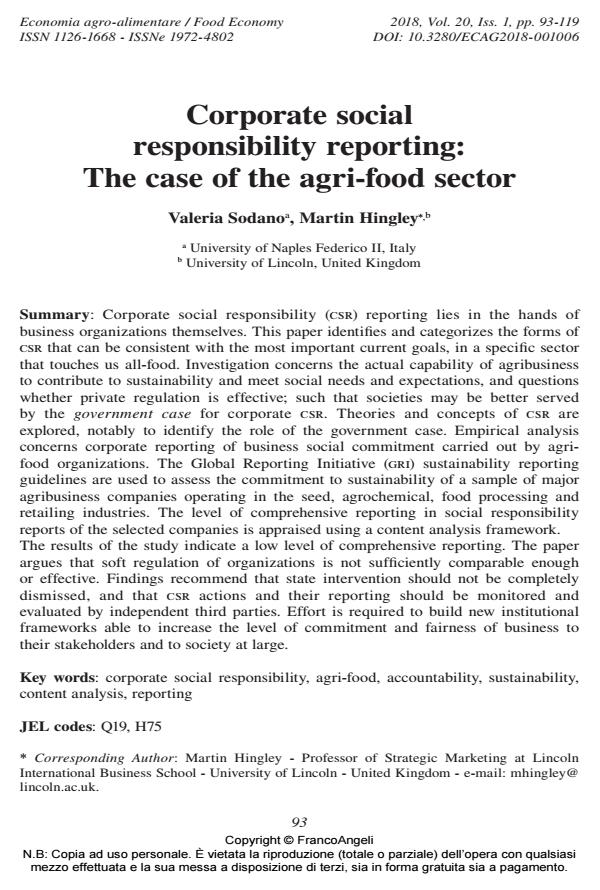Corporate social responsibility reporting: The case of the agri-food sector
Journal title ECONOMIA AGRO-ALIMENTARE
Author/s Valeria Sodanoa, Martin Hingley
Publishing Year 2018 Issue 2018/1
Language English Pages 28 P. 93-120 File size 261 KB
DOI 10.3280/ECAG2018-001006
DOI is like a bar code for intellectual property: to have more infomation
click here
Below, you can see the article first page
If you want to buy this article in PDF format, you can do it, following the instructions to buy download credits

FrancoAngeli is member of Publishers International Linking Association, Inc (PILA), a not-for-profit association which run the CrossRef service enabling links to and from online scholarly content.
Corporate social responsibility (csr) reporting lies in the hands of business organizations themselves. This paper identifies and categorizes the forms of csr that can be consistent with the most important current goals, in a specific sector that touches us all-food. Investigation concerns the actual capability of agribusiness to contribute to sustainability and meet social needs and expectations, and questions whether private regulation is effective; such that societies may be better served by the government case for corporate csr. Theories and concepts of csr are explored, notably to identify the role of the government case. Empirical analysis concerns corporate reporting of business social commitment carried out by agrifood organizations. The Global Reporting Initiative (gri) sustainability reporting guidelines are used to assess the commitment to sustainability of a sample of major agribusiness companies operating in the seed, agrochemical, food processing and retailing industries. The level of comprehensive reporting in social responsibility reports of the selected companies is appraised using a content analysis framework. The results of the study indicate a low level of comprehensive reporting. The paper argues that soft regulation of organizations is not sufficiently comparable enough or effective. Findings recommend that state intervention should not be completely dismissed, and that csr actions and their reporting should be monitored and evaluated by independent third parties. Effort is required to build new institutional frameworks able to increase the level of commitment and fairness of business to their stakeholders and to society at large.
Keywords: Key words: corporate social responsibility, agri-food, accountability, sustainability, content analysis, reporting
Jel codes: Q19, H75
- Food Sustainability and the Media Kristen Alley Swain, pp.101 (ISBN:9780323912273)
- Sustainable Transition of Meat and Cured Meat Supply Chain Andrea Caccialanza, Marco Marinoni, pp.243 (ISBN:978-3-031-34976-8)
- Innovation Trajectories and Sustainability in the Food System Valeria Sodano, in Sustainability /2019 pp.1271
DOI: 10.3390/su11051271 - ESG Frameworks for Sustainable Business Practices Ambili Jayachandran, Jose John, Ann Susan Thomas, I. S. Smiju, pp.1 (ISBN:9798369338803)
- Sustainability reporting as a tool for fostering sustainable growth in the agri-food sector: the case of Spain Carlos Anguiano-Santos, Melania Salazar-Ordóñez, in Journal of Environmental Planning and Management /2024 pp.426
DOI: 10.1080/09640568.2022.2115346 - Sustainable Transition of Meat and Cured Meat Supply Chain Davide Galli, Riccardo Torelli, Andrea Caccialanza, pp.265 (ISBN:978-3-031-34976-8)
Valeria Sodanoa, Martin Hingley, Corporate social responsibility reporting: The case of the agri-food sector in "ECONOMIA AGRO-ALIMENTARE" 1/2018, pp 93-120, DOI: 10.3280/ECAG2018-001006